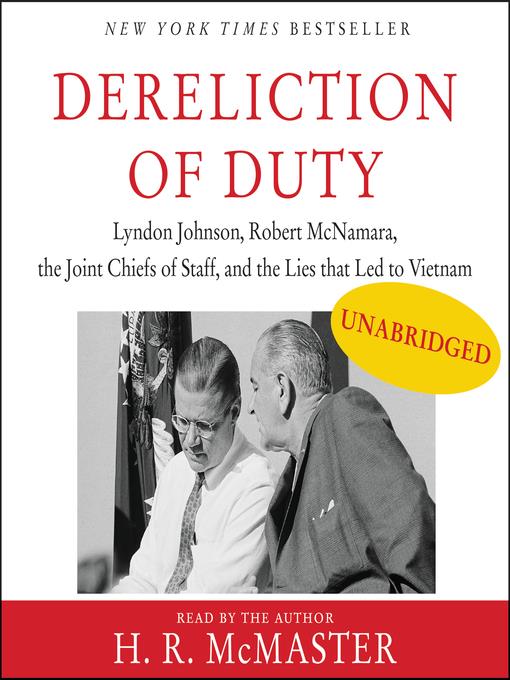
Dereliction of Duty
Johnson, McNamara, the Joint Chiefs of Staff, and the Lies That Led to Vietnam
کتاب های مرتبط
- اطلاعات
- نقد و بررسی
- دیدگاه کاربران
نقد و بررسی

December 30, 1996
Challenging the passive-voice argument that the U.S. was trapped by ideology or circumstance in its war in Vietnam, McMaster, a serving officer and Gulf War combat veteran, casts a harsh but penetrating light on a crucial aspect of that conflict. He presents the war as a consequence of specific decisions made by specific men. Lyndon Johnson's fixation on short-term domestic political goals, he says, limited his capacity to deal with a complex, remote international problem. Johnson compounded this shortcoming by insisting on consensus among his advisors--particularly within the military he distrusted. Robert McNamara, according to McMaster, believed he could satisfy the president's demands with a strategy of "graduated pressure" that offered minimal risk, cost and visibility. Meanwhile, despite fundamental reservations with McNamara's strategy, the Joint Chiefs of Staff failed to articulate objections and to develop alternatives, thus abdicating their professional and civic responsibilities. Instead, loyal to their particular services, committed to the principle of civilian control and seeking to make the best of a bad situation, the Joint Chiefs, McMaster says, acquiesced in a pattern of subterfuge and deception that shaped the war and its outcome before it even began. McMaster's seminal analysis demonstrates in particular that an officer's moral courage is as important as his willingness to face physical risk. The generals and admirals who kept silent as America descended into the Vietnam quagmire had many times been in harm's way. Yet when subjected to a final test, they were unable and unwilling to make the choice demanded of service-academy cadets: the harder right over the easier wrong, whatever the personal cost.

April 15, 1997
The "error not of values and intentions but of judgment and capabilities" to which Robert McNamara admitted in "In Retrospect" (1995) leaves out his deceptions that helped plunge America into the Vietnam War. McNamara may not have remembered them in his memoir, but army officer McMaster found them in the Joint Chiefs of Staff's archives for the crucial decision-making years of 1964 and 1965. Distilled to its essence, McMaster's thesis proposes that the plans and advice on Vietnam prepared by the nation's military advisers were systematically sidetracked by McNamara. Two facts exemplify the whole dense forest of facts McMaster explores: the prediction of the Joint Chiefs of the Army and Marine Corps that "victory" would require five years and 500,000 troops only reached LBJ's ears once (he didn't listen, obviously), and the Pentagon war games of McNamara's theory of "graduated pressure" eerily ended in stalemate. McNamara suppressed all such warning signs, theorizes McMaster, because he was responding to LBJ's anxiety to keep Vietnam's "noise level" down until the 1964 election was over and the Great Society safely enacted. As damning of the civilian leaders as he is, McMaster doesn't blithely exonerate the brass. They didn't heed their own warnings and acquiesced in McNamara's incrementalist policy, in the hope of eventually getting the huge force they diffidently advised would be needed to win. Writing about an ocean of memos, meetings, and reports as he does, McMasters delivers a narrative more diligent than dramatic, but his take on pinpointing the architect(s) of the Vietnam fiasco should prove, nonetheless, of high interest. ((Reviewed April 15, 1997))(Reprinted with permission of Booklist, copyright 1997, American Library Association.)

























دیدگاه کاربران